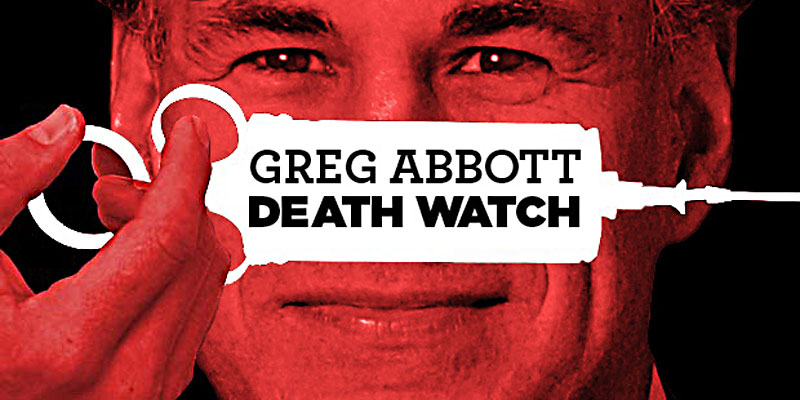Death Watch: Defense to D.A. – A Conflict of Interest?
John Hummel's attorney calls original trial lawyer's presence in D.A.s office "an irresolvable conflict of interest," seeks to stop execution on that ground
By Brant Bingamon, Fri., March 13, 2020
Michael Mowla, attorney for convicted capital murderer John Hummel, is working hard to keep his client from being executed on March 18. Mowla has filed motions for Hummel in state and federal courts and is asking the Texas Board of Pardons and Paroles to reduce his sentence to life without parole.
A principal focus of Mowla's appeals is Larry Moore – Hummel's original trial lawyer, now an assistant district attorney in Tarrant County working in the office seeking Hummel's death. Mowla calls Moore's presence in the D.A.'s Office "an irresolvable conflict of interest" and in February asked Hummel's trial court in Ft. Worth to stop the execution on that ground. The court refused; Mowla will be taking his request to the appeals courts further up the chain.
Over the years, Hummel's attorneys have argued that Moore did an inadequate job during the sentencing phase of the trial. They've said Moore should have put additional witnesses on the stand to prove that Hummel wouldn't be dangerous in the future, and that he didn't present evidence of Hummel's honorable discharge from the Marine Corps and a "complex traumatic disorder" he may have suffered. Mowla is seeking funds from federal district court to hire an expert to examine this possibility; he has also identified irregularities that he says invalidate Hummel's death warrant.
But his conflict of interest claim has drawn the most attention. Mowla says that criticism of Moore's lawyering has given the attorney a reason to want the case closed. "Consciously or not, Larry Moore and the Tarrant County District Attorney's Office stand to benefit by hastening Hummel's execution," Mowla writes. Hummel's trial court has responded that since Moore didn't directly participate in the D.A.'s work on this case, there was no conflict of interest; it likewise ruled that the irregularities in the death warrant don't amount to much.
A witness at Hummel's original trial described him as "a very unremarkable person," a way of saying that he had never been violent and seemed a successful family man. But Hummel had a lot of grievances. He'd felt unloved as a child, a learning disability had made him the object of ridicule in school, his career in the Marine Corps had disintegrated, and his wife and father-in-law criticized him frequently for his weight and inability to find a good job.
In the weeks before his crime, Hummel worked as an overnight security guard and often stopped at a convenience store on his way to the job. There, he met Kristie Freeze, a clerk in the process of divorcing her husband. Hummel quickly developed an obsession with her, and he and Freeze had sex a week before the murders. When Hummel told Freeze that his wife was pregnant, she ordered him to stop calling and texting. But on the night that Hummel killed his own 5-year-old daughter, he stopped first at Freeze's house to read bedtime stories to hers.
Hummel returned home that night around 11pm. "I remember standing there holding the kitchen knife, contemplating on whether or not to kill my wife for about 30 minutes," he later told police. When his wife interrupted his deliberation, Hummel stabbed and clubbed her, then went upstairs and methodically killed his daughter and father-in-law. He then set fire to the house.
Hummel confessed to the murders days later with no visible emotion. At trial, prosecutors presented evidence that, two weeks before the murders, Hummel had tried to kill the family by putting rat poison in their spaghetti dinner. The attempt had failed when the spaghetti turned green. The guilt portion of the trial was over quickly.
In the sentencing portion that followed, Larry Moore tried to get Hummel life without parole by calling Antoinette Rose McGarrahan, a psychologist, to the stand. She testified that Hummel likely suffered from narcissistic, antisocial, schizoid, and borderline personality disorders. Though he craved close relationships, he was unable to sustain them, McGarrahan said. She believed Hummel's flat affect was the result of "difficulty showing what he's feeling and what he's experiencing."
The jury sentenced Hummel to death. Since then, his appeals of Moore's lawyering have traveled through the courts. They've ruled that the people Hummel wanted Moore to put on the stand – jailers he got to know as he awaited trial – would only have repeated information the jury had already heard. The U.S. 5th Circuit Court of Appeals expanded on this argument in 2019, saying that because of the magnitude of Hummel's crime, "any unreasonably omitted mitigation evidence must be more than run-of-the-mill."
If the appeals put together by Mowla are denied by the courts and the BPP rejects clemency, Hummel will be the third person executed in Texas this year. Seven more are scheduled to be killed between now and July.
Got something to say on the subject? Send a letter to the editor.












